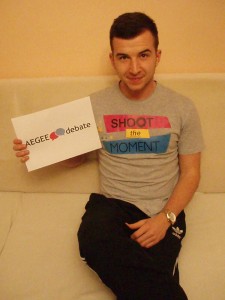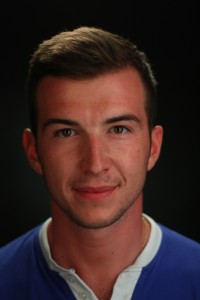We all know that AEGEE stands for – and is also known as – the European Students’ Forum. However, some AEGEE members have the feeling that our association lacks the true meaning of its last word sometimes. A forum means a “place outdoors”, a meeting or assembly for the open discussion of subjects of public interest. So, where was the place to exchange ideas open to all AEGEE members, other than the Agorae?
Ivan Bielik, speaker of the International Politics Working Group (IPWG), came up with the idea of a place to debate (“the ability of creating strong and valid arguments, thinking out of the box and defending your opinion”) inside AEGEE. Ivan is experienced in debating at an academic level, even though he strongly believes that it is not a skill that university is going to teach us, and he also admits that he constantly watches TED talks in his free time, using them as an inspiration for his talk at the last EBM in Valletta, under the title Dare to disagree.
“I said to myself that I could help solve this problem with my knowledge and experience which I have gained from debating at university level”, Ivan says. His idea was to launch an online platform that was simple, attractive and user-friendly, and to re-introduce the meaning of forum within AEGEE. This is the story of AEGEEDebate, which by now has three ongoing discussions.
The AEGEEan: We know you are experienced in academic debates, so how did you come up with the idea of AEGEEDebate?
Ivan: Debating is a skill, and I believe that the skills you practice in debates are essential for your life, but sadly, they are underrated. I believe that I have the responsibility to invite AEGEE members into discussions where they could practice these skills. I am not doing it for my own benefit or because I do not know what to do in my leisure time, but because I recognized that debating is essential for the whole Network to progress.
Then I came up with the idea of a common online forum, inspired by the British magazine The Economist: it has got its own sub-website dedicated to debates. I really liked the idea behind it. AEGEEDebate is more or less the same – two speakers, one relevant topic and an active audience. I am striving to achieve as higher quality as it is possible for our debate forum. Also, some friends of mine are active in a debate programme for kids and students. They are working voluntarily and with joy, and one of them set up a website for debating. It was and still is very interesting for me. I said to myself that I can do it as well for AEGEE, and the result is AEGEEDebate.
However, AEGEEDebate is not only focused on international politics, but on the internal work of AEGEE. Can these debates influence other bodies in AEGEE?
I intend to create a rather general debate forum. I expected some people would argue that it was not business of the IPWG to arrange debates about topics which are not relevant to this Working Group. I would like to clarify two things about this. First, I have a personal interest to keep the thematic purpose of IPWG and not to interfere with other AEGEE bodies. Second, I always try to be as impartial as possible when creating online debates. That means internal issues of AEGEE can be the subject of our debate forum if and only if the IPWG offers an equal opportunity for both sides to express their arguments (as in the recent regional distribution debate, for example).
Moreover, it would be a shame for me if I could create an online debate forum and then limit it only to politics-related debates. My idea is to have debates on current issues relevant for AEGEE members. That does not involve only politics, but also AEGEE world, economy, sports or human rights. The world is more complex than politics.
 People who have taken the initiative to start projects in AEGEE know how hard it is sometimes to increase members’ motivation. Did you have to face this as well?
People who have taken the initiative to start projects in AEGEE know how hard it is sometimes to increase members’ motivation. Did you have to face this as well?
Good point. After realizing why I should do the project, there were still more practical problems: choosing topics of debates, promoting the debates and recruiting speakers, which is still a problem for me. I completely understand that so far people are reluctant to apply for the position of speaker in the debate, because they do not know what they should do, do not have a clear opinion on the topic or do not have time. This is normal for a new project. But how could you find out? It is only by trying. I love challenges, thus I am doing my best to overcome such obstacles.
Do you expect this to be a long-term project?
I do not like to do short-term stuff. Yes, this project is, at least for me, a long-term affair. The idea behind AEGEEDebate is worth of keeping. Therefore, I would like to ensure the continuity of the project.
What about taking it to a statutory event and organising a sort of ‘live’ debate?
Yes, I thought of having a real-time debate at Spring Agora Rhein-Neckar, but I am not going there. Positive sign, however, is that some people already sent me an email saying that they would like to have ‘live’ debates also during statutory events. Maybe during Autumn Agora Zaragoza the wish will come true.
Does the International Politics Working Group have any other projects this term?
AEGEEDebate is a pilot project during this term. But it is not all. We are preparing two initiatives now. First, there is an idea of small thematic seminars throughout Europe. I joined forces with two Master students that are eager to elaborate on the topic of ultra-nationalism in Europe. AEGEE locals should provide these two guys with logistical support and audience for their seminar. In the end, there will be a common European outcome about the position of youth about ultra-nationalism. I believe that this initiative could be successful.
Second initiative is tackling the topic of divided societies. The IPWG would cooperate with the Culture Working Group. Comité Directeur also supports this idea. Basically, we would like to encourage our members to tackle the issue of divided society through essays, photography, painting, song or whatever. It might have a competitive nature. The best inputs then will be put into a common booklet and sent to Prof. James Skelly (panel speaker at EBM Valletta), who liked the idea. I hope that we could preserve the thematic content of IPWG through these initiatives.
Written by Anna Gumbau, AEGEE-Barcelona


